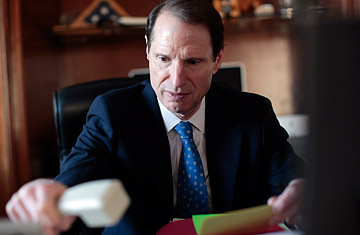
Oregon Democratic Senator Ron Wyden wants to lower the stated corporate tax rate to 24%
Washington is more divided than ever, but there's a surprising area in which lawmakers are finding a measure of consensus: corporate tax reform. Conservatives, unsurprisingly, support it, arguing that America's 35% corporate tax rate stymies investment. President Obama embraced reform, too, saying in his State of the Union address that America has "one of the highest corporate tax rates in the world." The President's debt commission has recommended adopting a single corporate tax rate as low as 23%.
In reality, few companies actually pay 35% of their profits to Uncle Sam, or even 23% for that matter. A series of generous corporate tax loopholes brings the effective rate for businesses down to barely a dime on every dollar earned, in some cases. Consider Boeing. Between 2008 and 2010, the company reported about $9.7 billion in pretax U.S. income. But the company received a rebate of $75 million, according to a new report from Citizens for Tax Justice, a Washington advocacy group.
One of the hurdles to reform could be that a streamlined tax code, even at a lower stated rate, could mean a corporate tax increase, something most Republicans and companies would oppose. What's more, at a time when the public is increasingly budget-conscious, skeptics wonder how well proposing lowering corporate taxes will play with voters. "It's a no-brainer that you have to eliminate all those loopholes," says Vermont Senator Bernie Sanders, who caucuses with the Democrats. "But do I believe at the end of the day it has to be revenue-neutral? I don't. Corporations are making a huge profit and in some cases getting a refund. It's wrong."
Nonetheless, many agree that the current system for determining what corporations pay Uncle Sam is a confusing state of affairs. At a recent Congressional hearing on the subject, North Dakota Democratic Senator Kent Conrad, the chairman of the Senate Budget Committee, called the current tax code a "Chinese riddle" that only a "contortionist" could deal with. A streamlined tax code could boost government revenue and at the same time provide clarity for corporate executives, many of whom have cited uncertainty about government tax policy as one of the reasons they have been slow to hire after the recession.
Surprisingly, the biggest driver behind the corporate tax-reform debate is President Obama. Beyond the State of the Union mention, the Treasury Department is believed to be formulating corporate tax-reform proposals. White House officials, meanwhile, say promoting corporate tax reform will be one of the key areas of focus for GE CEO Jeffrey Immelt, who was recently appointed head of the President's Economic Recovery Advisory Board. Immelt is likely to find much support among other CEOs. Caterpillar's Doug Oberhelman, who joined President Obama at a December meeting of CEOs at Blair House, recently told Fox News that the current corporate tax code "puts us at a little bit of a disadvantage. It encourages us to park foreign earnings outside this country. Wouldn't it be nice to have that free flow of funds back here and put some of that to work in the U.S.?"
One of the most promising blueprints for reform could come from a bill co-sponsored by Senator Ron Wyden, the Oregon Democrat. Wyden's bill lowers the stated corporate tax rate to 24%. At the same time, Wyden's bill would end special tax breaks favoring certain business sectors and repeal a rule that allows companies to defer taxes on income earned abroad. The exception would be small businesses — roughly defined as outfits earning less than $1 million annually — which Wyden proposes be allowed to expense all equipment bought in a given year.
The latest in a wave of hearings on corporate tax reform came Thursday, convened by Dave Camp, Republican Representative from Michigan and chair of the House Ways and Means Committee. There was the usual parade of small-business owners and tax experts. But few observers believe the hearings will amount to substantive action this year. Bob McIntyre, executive director of Citizens for Tax Justice, predicts corporate tax reform will likely be an issue during the upcoming presidential campaign cycle, as it was in 1984.
Wyden, though, says key fiscal scorekeepers, like the Tax Policy Center, have declared his bill to be "revenue neutral." The conservative Heritage Foundation even issued a report calling the bill "ambitious" and "excellent." So why now? Wyden frames the need for corporate tax reform as a job-creation bill. In the two years after the last significant tax reform became law in 1986, the U.S. created more than 6 million nonfarm jobs, Wyden says. During George W. Bush's two Administrations, just under 3 million jobs were added.
"There are other reasons that went into job creation in the 1980s," Wyden says, but tax reform "was a significant factor." He says his reform would create 2 million jobs and pump more than $500 billion into the economy by 2015. Nevertheless, Wyden remains optimistic. "We're really getting traction, for a sense of urgency."
